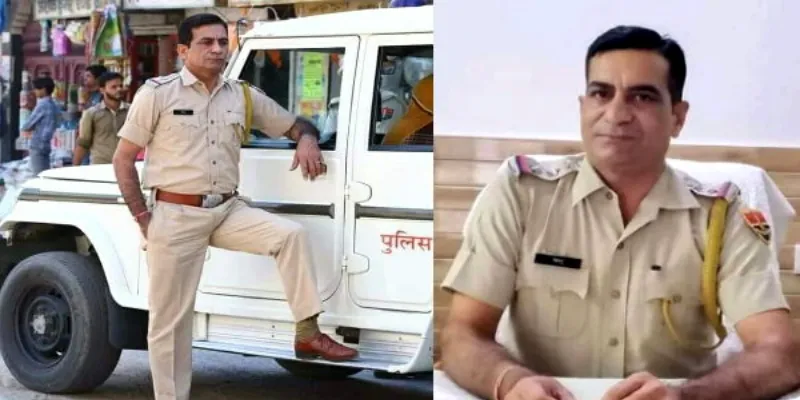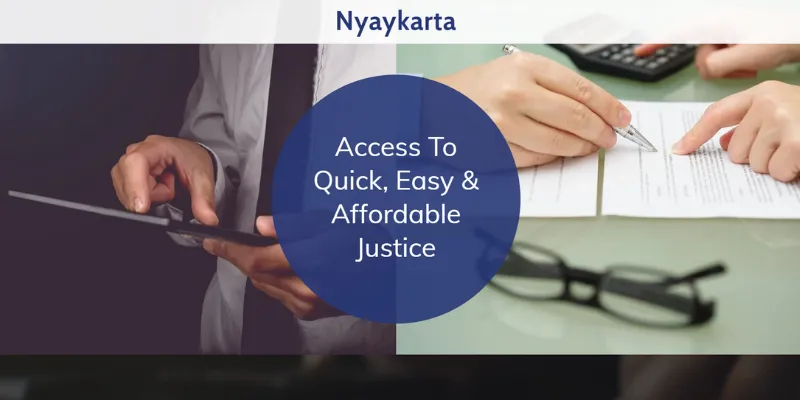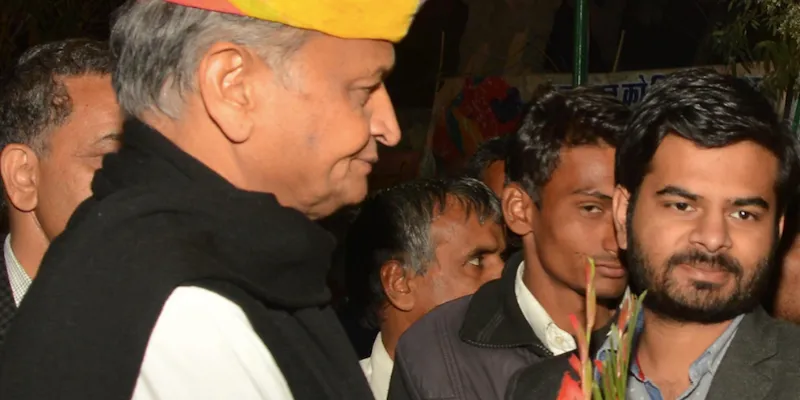How Nyaykarta is helping underprivileged get quick and affordable justice through its public grievance platform
To help people voice their concerns in the court of law, Shubham Sharma started legaltech startup Nyaykarta with over 500 legal and human rights experts.
On 23 May 2020, Vishnu Dutt Bishnoi, the Station House Officer in the Churu district of Rajasthan committed suicide. The state’s crime branch took over the probe and filed an FIR under Section 306 (abetment of suicide) of the Indian Penal Code.
Since Bishnoi had cited stress and dirty politics to be some of the reasons responsible for his extreme step, many individuals raised a demand for a CBI investigation. However, when things were going nowhere, legaltech startup intervened.

Vishnu Dutt Bishnoi
Image credit: Scrbblr
The legal experts on the platform reached out to the concerned authorities and raised an official request with the Rajasthan government. At present, the state has agreed for the CBI probe, and rearing hopes for speedy justice.
A lot of citizens experience discrimination, harassment, and other kinds of maltreatment in their daily lives. However, due to having sparse knowledge on the Indian legal system, and weary of the hassles of lengthy judicial proceedings, many of them fail to make their voices heard.
Founded by Shubham Sharma in May 2020, Jaipur-based legaltech startup Nyaykarta rolled out a public grievance platform that enables people to obtain justice expeditiously at a low cost. So far, the startup has seen more than 10,000 individuals registering a number of cases, concerning domestic violence, illegal termination of employment, and harsh behaviour from landlords.

Shubham Sharma, Founder, Nyaykarta.
In fact, a whopping 80 percent of these petitions stand resolved, thanks to the 500 legal and human rights experts on its platform.
“With 35 million cases still pending in the Indian court of law and 15 million fresh ones getting piled on every year, the Indian judiciary is mired with backlogs and procedural delays. The amount of money that is needed to obtain justice ranges anywhere between Rs 30,000 and a few lakhs per case. These elements make it hard for an average citizen to file a lawsuit. I wanted to change this trend with Nyaykarta by providing an alternative,” says Shubham Sharma, Founder of Nyaykarta.
Sowing the seeds
After completing his engineering from the Jaypee Institute of Information Technology, Noida, Shubham went on to lay the foundation for a home decor startup, as well as a B2B sales and marketing company.
A few years later, he kicked off his third venture Rajmanch, a platform for the effective implementation of government programmes.
For over three years, Shubham had been thinking about establishing a podium to address grievances.

A screenshot from the Nyaykarta website.
“I used to live in a rented house with a bunch of friends during my younger days. The owner of the place had collected more than a lakh from us as a security deposit. But, after a couple of months, he fled with all the money. Due to the fear of entangling in a legal hassle, we did not proceed to file a complaint. That incident was etched in my mind for a long time, and since then, I had been planning of bringing out a solution for it,” recalls Shubham.
It took Shubam another six months to conduct preliminary research and obtain insights from social activists after deciding to start his legaltech startup. He says it’s a mere coincidence that Nyaykarta took off at the same time when the COVID-19 pandemic erupted in India.
One of the first few cases that were reported on the platform was to do with extorting money from migrant workers on the premise they would be helped to go back home. This was followed by petitions such as workplace harassment and sudden employment terminations.

Shubham with Chief Minister Ashok Gehlot.
Bootstrapped since inception, Shubham faced quite a few challenges to get legal experts from various domains on board with Nyaykarta.
“It took a while for lawyers and human rights experts to believe in my idea. I had to convince them and explicitly explain the kind of impact it will create. Around 40 of them agreed to sign up in the beginning, and then the number gradually went up. At the end of two months, we had 540 of them, including cybercrime specialists, disability rights advocates, criminal lawyers, and corporate law experts,” Shubham explains.
In fact, the Chairman of International Human Rights Organisation Dr. Nem Singh Premi, as well as Indian lawyer Pratham Mittal, who practices across several countries like London, Dubai, and Delhi, also provide mentorship and guidance to the startup.
Empowering citizens to make their voice heard
To keep the process of registering a case on the platform simple and hassle-free, the startup asks for basic personal details like the name, age, address, contact number, and a brief of the issue at hand of the complainant.
If he/she does not own a smartphone or is oblivious to navigating through the website, a representative or a family member can file the case on their behalf.

An awareness session being held by the startup in rural Rajasthan.
Within a matter of five hours of raising the grievance, a legal expert from Nyaykarta gets in touch with the petitioner. Once the authenticity of the claim is validated, the process of the preliminary investigation is initiated, followed by consultation, mediation, or moving to the court of law, if required.
With technology streamlining everything, a handful of legaltech startups have sprung up in the last few years. Nonetheless, Nyaykarta’s end-to-end legal services at a reasonable price tag differentiate the startup from its competitors.
“Unlike the heavy costs incurred to fight litigations, we charge only Rs 2,000 to 3,000 per case. The intention behind this is to enable the common man, including the economically weak sections of the society, to stand up for themselves and obtain justice. Further, we have been providing legal assistance to migrant workers, medical professionals, and students during the lockdown, and will continue to extend it until the coronavirus dies down,” Shubham adds.
Supreme Court advocate Aditya Jain, who specialises in corporate law and has been engaged with Nyaykarta since its inception, has helped bring justice to many migrant workers in Rajasthan.
He says, “Migrant workers were not getting paid after the lockdown. When they filed a complaint on the Nyaykarta website, I assisted them and took the case to the High Court. Now, all of them have been paid their due. Nyaykarta is doing very well as a platform when it comes to connecting the needy to the legal system.”
At present, the founder is actively promoting Nyaykarta on various social media platforms to get the word out. Moving forward, the startup is looking to build a local assistance model to help people get comfortable with technology, especially in rural and backward areas, by appointing certain representatives.
Edited by Suman Singh








